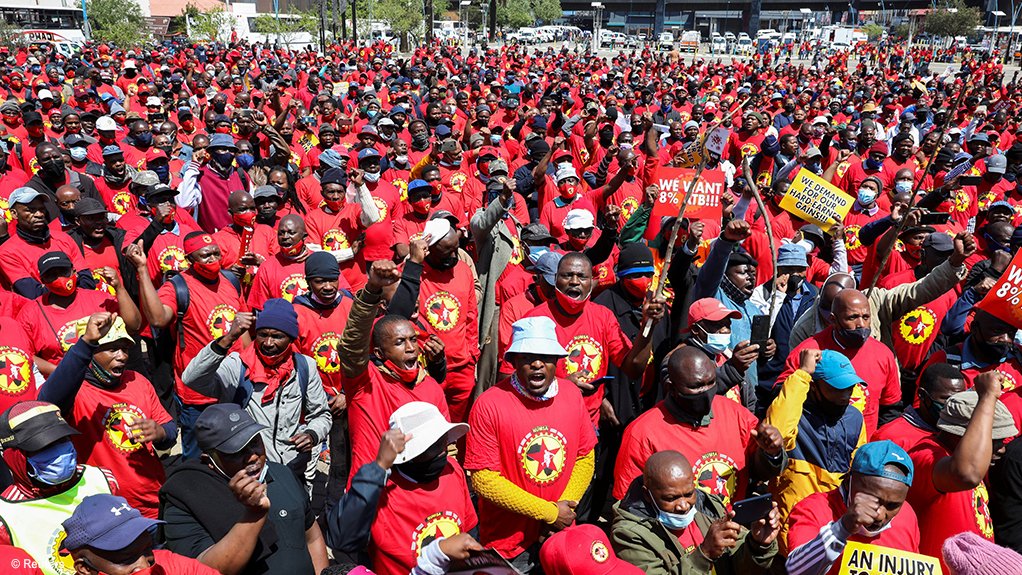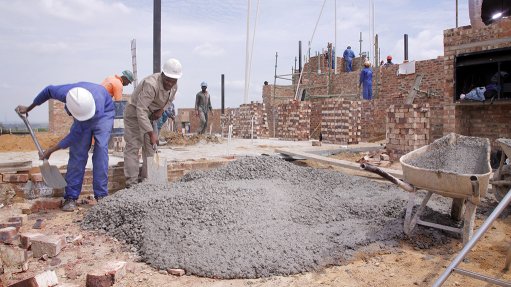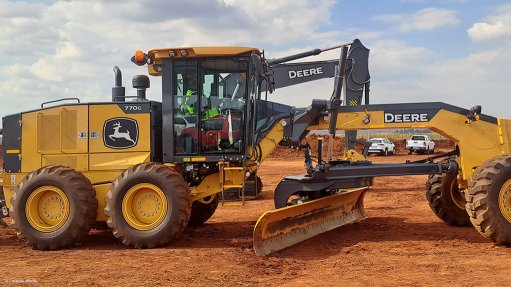Seifsa tables final three-year above-inflation wage offer in an effort to end strike
Industry employer organisation the Steel and Engineering Industries Federation of Southern Africa (Seifsa) has made a final wage offer to workers' unions in an effort to bring an end to the nine-day strike in the metals and engineering sector.
The offer is for the lowest-paid employees to receive a 6% increase in wages and higher-skilled employees a 5% increase.
The offer guarantees an above-inflation increase for three years from July 1, 2021, to June 31, 2024, for steel industry employees and Seifsa believes it is fair, equitable and sustainable in the context of the industry, economy and the country as it tries to come to grips with the economic effects of Covid-19 and given that the industry was struggling to retain jobs even prior to the pandemic, said Seifsa CEO Lucio Trentini.
"This year 30 000 jobs have been lost in the industry, striking workers have lost R100-million in collective wages over the current nine-day strike and the sector has lost about R500-million in revenue.
"Further, a general labourer in the steel and engineering sector receives a monthly wage of R12 700, which is significantly higher than national minimum wage of about R3 500 a month, and Seifsa members in the sector employ more than 200 000 people. In certain cases, one steel worker supports up to eight other people with his or her earnings."
Trentini added that the industry had lost more than half of its work force over the past 30 years and, while it had been identified as a potential growth sector and job creator, including through the National Steel Master Plan driven by the Department of Trade, Industry and Competition, the intimidation and violence observed outside some factory gates delayed any prospects of meaningful recovery.
Seifsa president and chairperson Elias Monage explained that the offer was final because further increases to these numbers narrowed the possibility of extending the offer to companies that are not part of the collective bargaining process.
"If we move the numbers further, we shrink the ability to extend the offer to all companies. The reason for the special dispensation offer for companies outside the collective bargaining process to join is because more than 60% of employees are not covered by any trade union and we need the majority of companies and workers to effectively bargain collectively to improve employment terms and conditions in the industry," he said.
Seifsa will advocate for a return to work October 18 and had tabled the offer to unions, including National Union of Metalworkers of South Africa on October 14.
However, Trentini emphasised that, within the collective bargaining process, there was no room for violence, intimidation and attacks on employees who continue to work.
"We respect and defend the right of employees to withdraw their labour, but also protect the right of people to work. We are in discussion with authorities to ensure visible policing in hotspots and we are rolling out a plan to assist our members," he said.
Seifsa will work with authorities to identify employees who have been involved in illegal actions, such as attacks, intimidation and destruction of property once the strike is concluded, with the aim of instituting disciplinary measures or opening criminal cases, as the severity of the actions dictate.
"We are doing everything in our power to ensure we can bring the strike to an end as quickly as possible. We are speaking to authorities to ensure that our members' property and employees who want to work are protected and allowed to work, and that employees perpetrating illegal acts are brought to book.
"The industry cannot have illegal incidents in the context of labour relations, and negotiated settlement is foundational to this process."
Seifsa believes that, should the wage offer be accepted, it would guarantee certain stability and industrial peace, said Trentini.
He called on all parties to take account of the damage being caused to the sector and ensure that the interests of the economy and country are placed at the forefront of considerations.
Further job losses, termed job shedding, are possible and the risk increases as the strike and illegal actions continue, he added.
"We are acutely aware of the pain our members are feeling and the nervousness permeating the industry. We are calling for visible policing and action in areas where the rule of law has broken down so that the situation does not degenerate into looting, as was seen in regions around South Africa in July.
"We understand what is at stake and thank our members for holding the line. We are doing our utmost to ensure the protection of individual member companies, without whom none of [the industry participants] would be present."
ECONOMIC OUTLOOK
Meanwhile, economic and investment consulting firm Don Consultancy Group chief economist Chifi Mhango said the industry had lost almost 34 000 jobs owing to the impact of Covid-19 strict lockdown restrictions, and its production base had declined by 13.7% and sales had dropped by 12.3%, according to StatsSA data.
The metals and engineering industry is a key component of the manufacturing base of the South African economy, contributing 29% to overall manufacturing production, and a significant employer of 35% of total manufacturing employment, he said.
“While there have been some green shoots recently in terms of production patterns and sales, as well as an export push into the African continent with a positive African region net trade balance, investment levels into the sector have been on a decline owing to a number of factors, such as rising energy costs and rising logistical costs.”
Further, the industry has also not been spared when it comes to imports, especially the type that have had negative impact on the trading environment for local producers. While there is debate around issues of pricing, it is also imperative that factors that have hindered investment into the sector are urgently examined through policy interventions, Mhango said.
“News of a continued deadlock in wage negotiations and continuing strike in the metals industry is depressing for the ailing South African economy. However, the current strike in the industry can also derail all the efforts from government, such as the Steel and Metals Fabrication Master Plan, which outlines a number of policy interventions to revive this ailing industry of the South African economy.”
The wage negotiation process require cool heads to prevail so that the efforts of the first six months of this year are not derailed owing to reduced production operation being caused by the strike, he said.
Comments
Press Office
Announcements
What's On
Subscribe to improve your user experience...
Option 1 (equivalent of R125 a month):
Receive a weekly copy of Creamer Media's Engineering News & Mining Weekly magazine
(print copy for those in South Africa and e-magazine for those outside of South Africa)
Receive daily email newsletters
Access to full search results
Access archive of magazine back copies
Access to Projects in Progress
Access to ONE Research Report of your choice in PDF format
Option 2 (equivalent of R375 a month):
All benefits from Option 1
PLUS
Access to Creamer Media's Research Channel Africa for ALL Research Reports, in PDF format, on various industrial and mining sectors
including Electricity; Water; Energy Transition; Hydrogen; Roads, Rail and Ports; Coal; Gold; Platinum; Battery Metals; etc.
Already a subscriber?
Forgotten your password?
Receive weekly copy of Creamer Media's Engineering News & Mining Weekly magazine (print copy for those in South Africa and e-magazine for those outside of South Africa)
➕
Recieve daily email newsletters
➕
Access to full search results
➕
Access archive of magazine back copies
➕
Access to Projects in Progress
➕
Access to ONE Research Report of your choice in PDF format
RESEARCH CHANNEL AFRICA
R4500 (equivalent of R375 a month)
SUBSCRIBEAll benefits from Option 1
➕
Access to Creamer Media's Research Channel Africa for ALL Research Reports on various industrial and mining sectors, in PDF format, including on:
Electricity
➕
Water
➕
Energy Transition
➕
Hydrogen
➕
Roads, Rail and Ports
➕
Coal
➕
Gold
➕
Platinum
➕
Battery Metals
➕
etc.
Receive all benefits from Option 1 or Option 2 delivered to numerous people at your company
➕
Multiple User names and Passwords for simultaneous log-ins
➕
Intranet integration access to all in your organisation





















